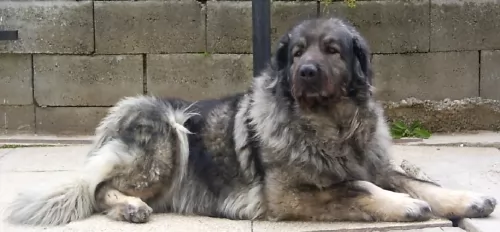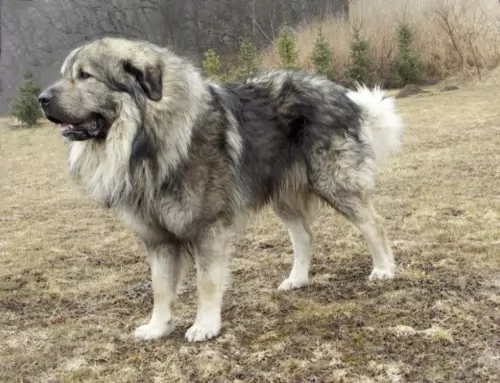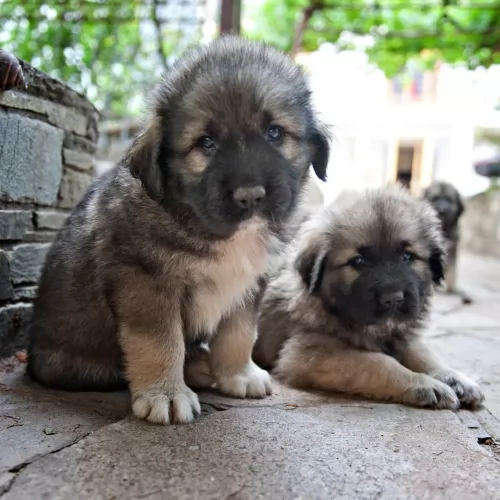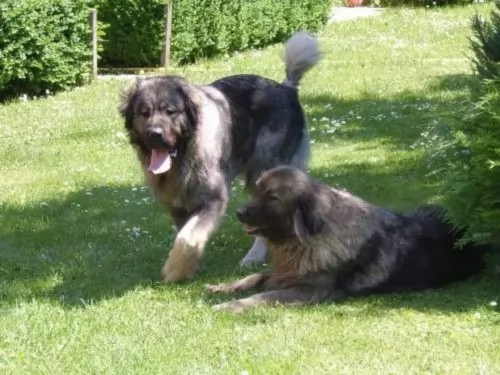 Petzlover
Petzlover German Spitz (Klein) is originated from Germany but Sarplaninac is originated from Macedonia. German Spitz (Klein) may grow 34 cm / 13 inches shorter than Sarplaninac. German Spitz (Klein) may weigh 35 kg / 77 pounds lesser than Sarplaninac. Both German Spitz (Klein) and Sarplaninac has almost same life span. German Spitz (Klein) may have less litter size than Sarplaninac. Both German Spitz (Klein) and Sarplaninac requires Moderate Maintenance.
German Spitz (Klein) is originated from Germany but Sarplaninac is originated from Macedonia. German Spitz (Klein) may grow 34 cm / 13 inches shorter than Sarplaninac. German Spitz (Klein) may weigh 35 kg / 77 pounds lesser than Sarplaninac. Both German Spitz (Klein) and Sarplaninac has almost same life span. German Spitz (Klein) may have less litter size than Sarplaninac. Both German Spitz (Klein) and Sarplaninac requires Moderate Maintenance.
 Also referred to as the Miniature Spitz, the German Spitz is believed to have descended from the Nordic Samoyed and Lapphund. Some dog experts say they were developed from the larger European Spitz, and that they were once referred to as Pomeranians.
Also referred to as the Miniature Spitz, the German Spitz is believed to have descended from the Nordic Samoyed and Lapphund. Some dog experts say they were developed from the larger European Spitz, and that they were once referred to as Pomeranians.
It is also thought that these dogs were in all likelihood brought over to Germany during the Middle Ages. This gives you an idea as to how ancient the breed is. There are actually 4 different Spitz breeds, divided by their sizes.
The dogs were originally used as herding and guard dogs, but today you could say that this toy breed is essentially a companion dog.
 Hailing from Macedonia, the beautiful Sarplaninac dog was developed as a guardian of livestock and is large enough to fight off large predators like bears and wolves.
Hailing from Macedonia, the beautiful Sarplaninac dog was developed as a guardian of livestock and is large enough to fight off large predators like bears and wolves.
Nobody is too sure of the breeds exact origins, though it is thought that its ancestors came to the Balkan Peninsula with people migrating from ancient Asia.
This huge dog is one of the oldest native breeds from ancient Molosser breeds. The dog was recognized in 1939, and in 1954 it became known as the Yugoslav Shepherd Dog. Later the name changed and the dog was recognized by the United Kennel Club in 1995.
 Classified as a toy breed, the German Spitz Klein looks like a small fox with his thick fur. He stands at between 23 – 28cm in height and he weighs 5 to 10kg.
Classified as a toy breed, the German Spitz Klein looks like a small fox with his thick fur. He stands at between 23 – 28cm in height and he weighs 5 to 10kg.
He has a sharp foxy face with small pointed upright ears and dark, bright eyes.
The double coat of the dog which can be fawn, cream, reddish, brown or black or a mixture of these colors, is straight, vibrant and off-standing to look at. He has a soft woolly undercoat. The tail of the dog curls up over the back.
The German Spitz Klein has got such a bright little face. He is a social, friendly dog, forming a strong bond with his human family. He is a smart dog too and can be easily trained.
Lively and independent, he is bold and adventurous. Even with a small dog like this, he will do well to be trained and socialized as he just becomes a better dog -obedient and relaxed around strange people and dogs.
Because of his size, he adapts well to life in the city or in the countryside. This is also because he doesn’t require a lot of exercise. The litter size for the German Spitz Klein is between 1 and 5 puppies.
 The Sarplaninac is a large, strong, fluffy dog standing at between 54 and 62cm in height and weighing between 30 and 45kg.
The Sarplaninac is a large, strong, fluffy dog standing at between 54 and 62cm in height and weighing between 30 and 45kg.
The coat of the dog is dense, coarse and of medium length. Colors are different shades of grey, white, tan and black. The head is large, the ears are fairly short but are floppy and covered with short hair. The dog is deep chested and the tail is long, often held high and covered with thick, feathery hair.
Protective, reliable, reserved, stubborn and gentle, this intelligent dog is fairly serious, and while he makes a devoted family pet, he is cool and wary of strangers.
Excellent training and socialization makes him well mannered, balanced and obedient around different people. He will tolerate children but won’t take easily to other pets in the house, capable of becoming aggressive with them.
 This litle dog is seriously a case of ‘dynamite in a small package’. Bold, daring, brave, spunky, clever, playful and friendly, your confident little German Spitz Klein makes most families the perfect pet and companion.
This litle dog is seriously a case of ‘dynamite in a small package’. Bold, daring, brave, spunky, clever, playful and friendly, your confident little German Spitz Klein makes most families the perfect pet and companion.
Give him the love and attention he deserves, especially because he is undemanding and low maintenance, and with good care you’re going to have a most adoring companion for more than a decade.
 These dogs are protective, but they’re not vicious. When properly raised they are wonderful family pets.
These dogs are protective, but they’re not vicious. When properly raised they are wonderful family pets.
True, it’s a large, strong willed dog that isn’t a good choice for the first-time dog owner. They are good with children, but only children who have been taught how to treat animals with care and patience.
This dog is a powerful guardian type of dog, imposing in size, but it’s all about upbringing, and if you bring him up well then he can make a tremendous pet and companion.
 You’ve got a pretty healthy little dog breed but be that as it may, it doesn’t make him totally immune to some of the common dog diseases there are. With him, you might want to look out for eye disease and epilepsy.
You’ve got a pretty healthy little dog breed but be that as it may, it doesn’t make him totally immune to some of the common dog diseases there are. With him, you might want to look out for eye disease and epilepsy.
Glaucoma occurs when there is pressure in the eye. Your dog will have pain, red eyes, dilated pupils, increased tear production and corneal cloudiness. You want to have him at the vet for this because putting off treatment can lead to blindness.
This is a condition that can gradually lead to blindness even though the eyes look normal. Difficulty with seeing at night is one symptom. Fortunately the condition is painless and your dog finds ways to cope with the problem.
It is always a good idea when you suspect anything wrong with your pet, to get him to the vet as soon as possible.
 The Sarplaninac dog is a robust dog but he can suffer from health issues such as hip dysplasia, obesity, bloat, ear infections and skin allergies.
The Sarplaninac dog is a robust dog but he can suffer from health issues such as hip dysplasia, obesity, bloat, ear infections and skin allergies.
When your dog gazes up at you with such love in his eyes, don’t be tempted to pop some chocolate into his mouth or let him finish off your ice-cream. Treats like this can damage your pet’s health and give him heat intolerance, breathing difficulties, hypertension, liver disease and diabetes.
 As a feisty small-sized dog breed, your foxy little German Spitz Klein needs to get the very best food there is. If you are going to feed him a high-quality commercial dog food, make sure to read the ingredients on the packaging and buy him food according to his size and age. Mix in some home-made food from time to time and always ensure he has constant access to cool, fresh drinking water.
As a feisty small-sized dog breed, your foxy little German Spitz Klein needs to get the very best food there is. If you are going to feed him a high-quality commercial dog food, make sure to read the ingredients on the packaging and buy him food according to his size and age. Mix in some home-made food from time to time and always ensure he has constant access to cool, fresh drinking water.
He has a fairly long, thick coat, so a good brush twice a week will be adequate. While you’re brushing him, check him over for fleas and ticks too.
Always check his teeth and brush them a couple of times a week too. Bad teeth can cause a host of problems, not only with the teeth, but other parts of the body too.
He is an active, jaunty little dog that loves all kinds of games. Being a small breed, he isn’t going to be the kind of dog that you need to include in your jogging or cycling trips, but he is no couch potato, and he will love to go on a walk with you, and it also does him good to get out and about for a change of scenery.
 Every dog needs care from puppyhood through to old age.
Every dog needs care from puppyhood through to old age.
Šarplaninacs are looked upon as medium maintenance dogs. The coat is long and thick and requires a firm bristle brush to get their hair brushed.These dogs are moderate shedders so a brush twice a week will do the trick to keep the hair free of loose hair and matting.
Because these dogs have floppy ears, they will need to be checked and cleaned. Floppy eared dogs battle with moisture and wax build-up that increases the likelihood of ear infections.
Check the eyes that they are clear and free of discharge. Eyes with a lot of discharge can be indicative of health problems.
Check for any unusual lumps as cancer often starts with a new lump.
Provide your pet with a nice warm, dry place to sleep.
Keep his vaccines up to date to prevent deadly canine diseases.
Have him or her spayed or neutered if you don’t want puppies. These are regular procedures for a vet and offers health benefits for the dog. Neutering a male improves his character and keeps him from roaming. These dogs are capable of having 3 – 8 puppies.
The Sarplaninac requires decent food if he is to remain healthy. Dog’s stomachs can become upset if they eat all kinds of sweet and spicy human foods.
Commercially manufactured dog food is a good backup food to have because of its convenience. Try to include some home-made food. Simply add into one big pot chicken, brown rice or pasta and spinach, sweet potatoes and carrots. This food can all be chopped up and added in to the dry kibble twice a week. Give this to your pet twice a week and see how his tails wags when he smells it.
Also try to add in some raw meat to his food occasionally.
Ensure there is always a bowl of fresh, cool water within his reach.